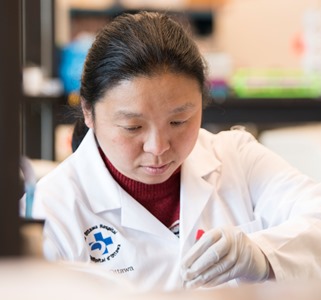 “Our findings lay the groundwork for repurposing metformin to help repair damaged nerve insulation in the brain and spinal cord,” said Dr. Jing WangA study in mice led by Dr. Jing Wang suggests that the diabetes drug metformin may be able to repair damage to nerve insulation caused by diseases like MS and stroke. These diseases attack the insulation around nerves known as myelin.
“Our findings lay the groundwork for repurposing metformin to help repair damaged nerve insulation in the brain and spinal cord,” said Dr. Jing WangA study in mice led by Dr. Jing Wang suggests that the diabetes drug metformin may be able to repair damage to nerve insulation caused by diseases like MS and stroke. These diseases attack the insulation around nerves known as myelin.
Loss of myelin and myelin-producing cells causes a variety of symptoms, including fatigue, vision and mobility problems, as well as social cognitive changes that affect interpersonal communications. Treatments for these cognitive symptoms are a major unmet need among patients with these diseases.
Dr. Wang’s team developed a mouse model that can be used to test possible treatments for some of these social cognitive symptoms. These mice have impaired social behavior following damage to nerve insulation in the part of the brain that is essential for social cognition. Treating the mice with metformin repaired the damage and improved their social interactions. With help from Dr. Rashmi Kothary and Dr. Diane Lagace the team found that metformin was doing this in two ways. First, it was recruiting neural stem cells to the damaged site and increasing the number of cells that would become myelin-forming cells. It was also encouraging these cells to mature into myelin-forming cells.
“Our findings lay the groundwork for repurposing metformin to help repair damaged nerve insulation in the brain and spinal cord,” said Dr. Jing Wang, senior scientist at The Ottawa Hospital, associate professor at the University of Ottawa
Authors: Jayasankar Kosaraju, Matthew Seegobin, Ayden Gouveia, Charvi Syal, Sailendra Nath Sarma, Kevin Jiaqi Lu, Julius Ilin, Ling He, Fredric E. Wondisford, Diane Lagace, Yves De Repentigny, Rashmi Kothary, Jing Wang
Source: Experimental Neurology
Core Resources: University of Ottawa Animal Behaviour and Physiology Core, CHEO’s Electron Microscope Laboratory
Funding: This study was funded by the Ontario Institute for Regenerative Medicine and the Stem Cell Network. All research at The Ottawa Hospital is enabled by generous donations to The Ottawa Hospital Foundation.
The Ottawa Hospital is a leading academic health, research and learning hospital proudly affiliated with the University of Ottawa.
Media Contact
Amelia Buchanan
Senior Communication Specialist
Ottawa Hospital Research Institute
613-297-8315
ambuchanan@ohri.ca
